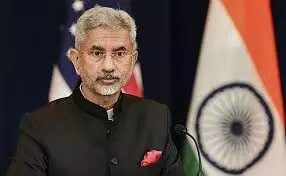Jaishankar Warns: ‘We Will Strike Terrorists Inside Pakistan if Needed’

External Affairs Minister S. Jaishankar has made it clear that Operation Sindoor—launched in response to the deadly Pahalgam terror attack last month—is still ongoing, and that India will not hesitate to strike terrorists across the border if provoked again.
In an interview with Dutch broadcaster NOS, Jaishankar stressed that the operation is a reflection of India’s tougher approach to cross-border terrorism. "The message is clear—if there are attacks like the one on April 22, we will respond. And if the terrorists are in Pakistan, we will strike them there," he said.
The Pahalgam attack, which killed 26 civilians in Jammu and Kashmir, was described by Jaishankar as a brutal assault meant to disrupt tourism and inflame religious tensions. The victims were reportedly targeted based on their faith, making the attack particularly heinous.
In retaliation, India launched Operation Sindoor on May 7, striking nine terror camps in Pakistan-controlled areas. This led to four days of intense fighting between the two nations, involving drones, missiles, and long-range weapons. Hostilities eased on May 10, when both sides agreed to halt military actions.
Jaishankar emphasized that while active fighting has stopped, the operation itself is ongoing. "You can call it dormant or whatever you like, but the operation continues as a signal—terror attacks will not go unanswered."
He dismissed any claims of international mediation in the ceasefire, particularly rejecting U.S. President Donald Trump’s suggestion that Washington played a role. "The decision to cease fire on May 10 was a bilateral one between India and Pakistan. No third party was involved," Jaishankar clarified.
The Indian response on May 10 was significant. After Pakistani forces opened fire, India struck eight of their airbases, targeting runways and command centers, rendering them non-functional. According to Jaishankar, this forced Pakistan’s military to agree to a ceasefire.
India holds Pakistan's military, particularly Army Chief Gen. Asim Munir, responsible for fostering an environment that encourages extremism. Jaishankar pointed to recent remarks by Munir promoting the two-nation theory as indicative of the mindset driving attacks like the one in Pahalgam.
While leaders from the U.S., West Asia, and other regions reached out to urge restraint, Jaishankar reiterated that the ceasefire was arranged directly between the two militaries. "If Pakistan wanted to stop the fighting, their general had to call ours. And that’s exactly what happened."
On broader India-Pakistan relations, Jaishankar was clear: India is only open to discussions on two issues—an end to terrorism, and the return of Pakistan-occupied Kashmir. Borders, he stressed, are non-negotiable because "Kashmir is an integral part of India."
When asked if ongoing tensions with Pakistan and China were hindering India's economic growth, Jaishankar responded, “Security and prosperity go hand-in-hand. Our threats are very real, and we've had to prioritize national security. That’s a lesson the world, especially Europe, is beginning to understand now.”
